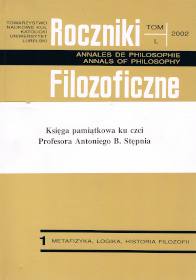Trzy strategie dyskusji ze sceptycyzmem
Abstrakt
In debate with scepticism three general strategies may be differentiated: (1) pointing to self-refutation of scepticism; (2) looking for certainty; and (3) modification of the concept of knowledge. The latter strategy has at least three versions: (a) knowledge does not require certainty, (b) knowledge is not broadened by way of deduction, and (c) knowledge does not require the knowledge of knowledge. The first strategy refutes global scepticism, but does not give an example of knowledge and is not efficient in the case of scepticism based on the hypothesis of the malicious scientist. Also the second strategy is only able to refute the typical thesis of global scepticism (knowledge does not exist). Scepticism based on the hypothesis of the malicious scientist is more efficiently refuted in the third strategy. However, separation of knowledge and certainty is only avoiding the problem of scepticism. It is also doubtful if the principle of broadening knowledge by way of deduction may be refuted. Negation of the principle of transparency of knowledge is the most convincing one. After it is refuted, knowledge is possible in the situation when we do not know if we know and we cannot exclude sceptical hypotheses.
Bibliografia
Augustyn św. (1953), Dialogi filozoficzne, przeł. K. Augustyniak, Warszawa: IW PAX.
Butler K. (2000), Problems For Semantic Externalism and A Priori Refutations of Skeptical Arguments, „Dialectica”, 54, s. 29-49.
Chisholm R. M. (1994), Teoria poznania, przeł. R. Ziemińska, Lublin: Daimonion.
Dancy J. (1985), An Introduction to Contemporary Epistemology, Oxford−New York: Blackwell Publishers.
Davidson D. (1980), Myśl i mowa, w: Język w świetle nauki, red. B.Stanosz, Warszawa: Czytelnik, s. 340-362.
Descartes R. (1958), Medytacje o pierwszej filozofii wraz z zarzutami, przeł. K. M. Ajdukiewiczowie, Warszawa: PWN.
Dretske F. I. (1970), Epistemic Operators, „The Journal of Philosophy”, 67, s. 1007-1023.
Dretske F. I. (1981), Knowledge and the Flow of Information, Cambridge, MA: MIT Press, Bradford Book.
Dretske F. I. (1988), Rec. z: A. Goldman, Epistemology and Cognition, „The Journal of Philosophy”, 85, s. 265-70.
Frydman D. (1960), Zagadnienie oczywistości u Fr. Brentany, w: Charisteria: Rozprawy filozoficzne złożone w darze Wł. Tatarkiewiczowi w siedemdziesiątą rocznicę urodzin, red. T. Czeżowski, Warszawa.
Goldman A. I. (1986), Epistemology and Cognition, Cambridge, MA: Harvard University Press.
Husserl E. (1989), Wykłady z fenomenologii wewnętrznej świadomości czasu, przeł. J. Sidorek, Warszawa: PWN.
Ingarden R. (1971), U podstaw teorii poznania, Warszawa: PWN.
Ingarden R. (1974), Wstęp do fenomenologii E. Husserla, Warszawa: PWN.
Judycki S. (1999), Epistemologia XX wieku: przegląd stanowisk, „Roczniki Filozoficzne”, 46-47, z. 1, s. 5-67.
Klein P. D. (1992), Scepticism contemporary, w: J. Dancy, E. Sosa (eds.), A Companion to Epistemology, Oxford: Blackwell, s. 458-462.
Kołakowski L. (1991), Husserl i poszukiwanie pewności, Warszawa: Aletheia.
Küng G. (1981), Czy możemy poznawać rzeczy takimi, jakimi są? (Współczesny antykartezjanizm i jego granice), przeł. T. Styczeń, „Zeszyty Naukowe KUL”, nr1, s.21-37.
Lehrer K. (1974), Knowledge, Oxford: Clarendon Press.
Lorenz K. (1977), Odwrotna strona zwierciadła. Próba historii naturalnej ludzkiego poznania, przeł. K. Wolicki, Warszawa.
McGinn C. (1984), The Concept of Knowledge, „Midwest Studies in Philosophy”, 9, s.529-554.
Nozick R. (1981), Philosophical Explanations, ch. 3, Oxford: Clarendon Press, s.167-288.
Putnam H. (1981), Reasons, Truth and History, Cambridge: Cambridge Univ. Press.
Putnam H. (1998), Wiele twarzy realizmu i inne eseje, przeł. A. Grobler, Warszawa: PWN.
Shoemaker S. (1963), Self-Knowledge and Self-Identity, Ithaca: Cornell University Press.
Stępień A. B. (1964), Wprowadzenie do metafizyki, Kraków.
Stępień A. B. (1965a), W sprawie możliwości teorii poznania, „Roczniki Filozoficzne”, 13, z. 1, s.73-88.
Stępień A. B. (1965b), Zagadnienie punktu wyjścia teorii poznania, „Roczniki Filozoficzne”, 13, z. 1, s. 89-104.
Strawson P. F. (1980), Indywidua. Próba metafizyki opisowej, przeł. B. Chwedeńczuk, Warszawa: IW PAX.
Swinburne R. (1983), Review of R. Nozick's Philosophical Explanations, „Australasian Journal of Philosophy”, 61, s. 303-307.
Williams M. (1991), Unnatural Doubts. Epistemological Realism and the Basis of Skepticism, Oxford, UK−Cambridge, USA: Blackwell.
Williamson T. (1995), Is Knowing a State of Mind, „Mind”, 104, s.533-565.
Wittgenstein L. (1993), O pewności, przeł. M. i W. Sady, Warszawa: Aletheia.
Copyright (c) 2002 Roczniki Filozoficzne

Utwór dostępny jest na licencji Creative Commons Uznanie autorstwa – Użycie niekomercyjne – Bez utworów zależnych 4.0 Międzynarodowe.





